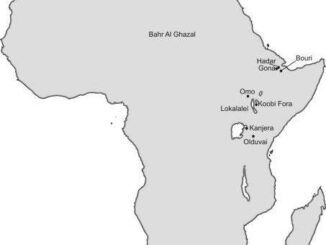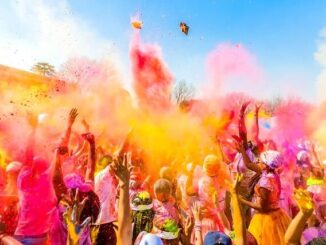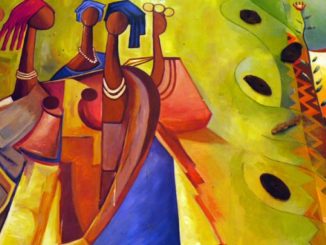
Born on 3rd December 1949 in Abako sub-county village in Moroto County in Lango District in Uganda, John Charles Akii-Bua (occasionally misspelled as Aki-Bua, or Aki-Buwa, or Akii-Buwa) left school early, at age 15, with an elementary school education. His leaving school early partly had to do with the death of his father and his having to help with family labor whereby he herded cattle and also worked in a local family retail store. As a boy, Akii was not significantly competitive in athletics. His informal athletic build-up came from the rigors of herding and protecting cattle from wild animals. In an interview in “Sports Illustrated,” soon after his Olympic gold medal win, Akii would proudly remark that the lions were particularly weary of his presence when he was there and would not go after the animals he was herding.
When Akii joined the police force in the capital city Kampala, still as a teenager, he again benefited athletically from the rigorous police drills. Akii’s potential in formal athletics was soon noticed, he started training in both track and field events. A police officer Joram Ochana who conveniently was the Africa’s 440 yards-hurdles champion intensified Akii’s training regimen. Akii soon won in eight events at the national police track and field championships. Apart from the hurdles, Akii was quite good at the javelin, the sprints, the 800m, among others and he would even establish a national decathlon record. Concentrating on the hurdles intensified after he was placed under the tutelage of the new national coach from the United Malcolm Arnold. Arnold was Uganda national coach from 1968 to 1972.
Akii-Bua triumphed in the 110 meters-hurdles finals at the East and Central African Championships held in Kampala in 1969. The influence of Arnold, convinced Akii that he would reap more benefits as a 400 meters-hurdler. In the finals of the 400 meters-hurdles at the Commonwealth Games held in Edinburgh in 1970) Akii-Bua struggled with a hernia and back strain injury, he was trailing last at the last 100 meters, but still raced in fast to become fourth in 51.14 seconds. Akii-Bua was notably an unconventional hurdler—he could easily jump over hurdles either with the left or right leading leg.
Akii-Bua’s first significant introduction to the athletic world was his win short-hurdles win at the USA vs. Africa (USA-Pan African) meet on 17th July 1971 in Durham, North Carolina. Akii-Bua won in an astonishing 49 seconds, a new Africa record, and the fastest time of the year. The world record of 48.1 held by Dave Hemery of Britain was less than one second away! Akii had conquered his demons of the Commonwealth Games, neatly beating his doubting African competition including Kenyan hurdler William Koskei who had won the silver at the Commonwealth of Nations Games. The track meet was significantly historical and heavily highlighted by Ebony magazine. Other African track stars that performed exceptionally well included legends Kipchoge Keino (1500m) and Ben Jipcho (3000m steeplechase) of Kenya and Miruts Yifter (5000m and 10000m) of Ethiopia. A couple more African athletes exceeded their expectations at the meet. Akii-Bua would soon be listed in the Afro-American Encyclopedia. He would be offered athletic scholarships from several American colleges but he would turn them down on the grounds that his family needed his presence and financial support at home in Uganda.
At the Olympic Games of 1972 in Munich, Akii-Bua, (by now in Uganda nicknamed “the flying policeman”) was the only one of the competitors, to win in all three of the heats in which he was placed, including the acclaimed finals win. In all the competitions, Akii-Bua would be placed in the strenuous and disadvantageous either of the inner lanes one or two.
The Semi-Final in which Akii-Bua was placed also included top medal prospects David Hemery (Olympic champion from Britain) and American and world leading Ralph Mann (United States). Here Akii-Bua beat his top competition, Ralph Mann was second, and Dave Hemery was third. The Finals witnessed the medal tally in exactly the same order.
At the Olympics of 1972, on 2nd September, Akii-Bua officially became the first man in history to run the 400 meters-hurdles below 48 seconds, finishing first in the acclaimed 47.82 world record.
Akii-Bua and his coach Malcolm Arnold had actually predicted a possible 47 seconds world record gold medal win at the Olympics. Akii had trained hard, doing repetitive short and long-distance hurdle drill runs with heavy weights attached to his body. During a practice run, Akii-Bua is said to have unofficially run under the 400 meters-hurdles world record at Wankulukuku Stadium near Kampala. But Akii-Bua and Arnold humbly did not make much light about it, and waited for the official moment to come. Many, including, Dave Hemery, believe that Akii-Bua would have posted a significantly faster world record if he had been in the convenient middle lanes other than the “tight” inner first lane in the hurdles Olympic final.
Compared to his renowned African peer athletes such as Ben Jipcho (Kenya), Mike Boit (Kenya), and Filbert Bayi (Tanzania), Akii-Bua was significantly much less active in international competition. Many attribute this to the Uganda regime of Idi Amin (1972-1979) as being detrimental to Akii’s athletic potential. During the regime, Akii and many of his relatives became targets of political interest, he was occasionally under house arrest, and his being underfunded meant that he would not compete and train internationally as much as his peers. Even at the Olympic Games in Munich, Akii was wearing an old pair of puma running shoes and a spike on one of them was missing. Akii-Bua was of the ethnic group (Lango) of President Apollo Milton Obote who was overthrown by Idi Amin’s loyal soldiers. There were persecutions during the Amin regime and many Langi fled into exile, many into Tanzania, and they would make attempts to overthrow Amin. Some of Akii-Bua’s relatives were killed during Amin’s regime.
After the 1972 Olympic gold medal win, after four decades, John Akii-Bua is still the only African short distance and also hurdles Olympic gold medallist. He would not participate in the 1976 Olympics that were held in Montreal because of the political boycott by Uganda and many other African countries. But notably, Akii-Bua, with a personal best of 48.69s in the 400 meters-hurdles, was ranked 6th in the world. Also, several weeks prior to the Olympics, he had won in the 400m flat at a meet in Dusseldorf in a personal best of 45.82s. Unfortunately, only three weeks prior to the Olympics, Akii’s left hamstring muscle tore. That would have reduced his chances of winning a medal in Montreal. It turned out that American Edwin Corley Moses would win the gold, finishing in a world-record time of 47.63s.
Unless otherwise stated, PONIREVO and/or its licensors DO NOT own any intellectual property rights in the website and material on the website. Majority of the site’s content has been scraped and auto posted by a third party artificial intelligence program —– PONIREVO Creation Team.
Proudly WWW.PONIREVO.COM



